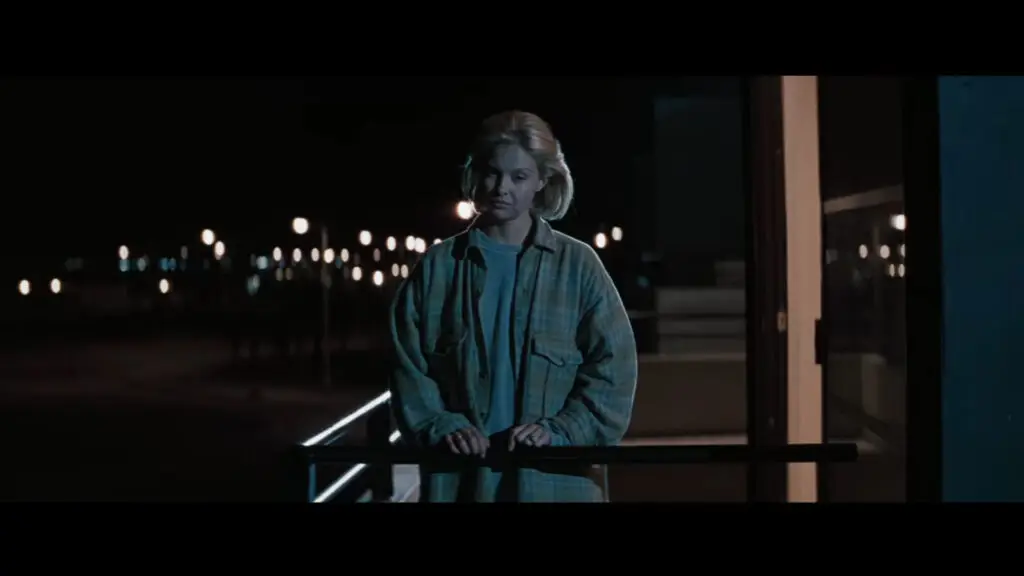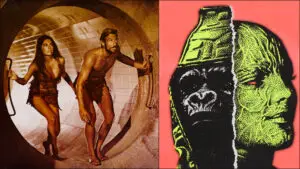In spring and summer 2023, Al Pacino and Robert De Niro both fed the celebrity gossip mill by turning into late-game baby daddies. “Horny old men who won’t stop spreading their seed,” as comedian Chelsea Handler puts it, is nothing new. But dubious male-female dynamics were on my mind while recently revisiting Heat, the 1995 crime drama from writer-director Michael Mann.
Most of the nearly 3-hour film consists of Pacino’s obsessive police detective and De Niro’s focused, heist-planning criminal took turns cat-and-mousing like old pros. At the time, much of the movie’s publicity hype centered around their mid-movie confrontation, the first time the two screen legends appeared in a scene together (they were both central to The Godfather Part II (1974) but inhabited separate parts of the story).
Heat was a hit, with critics also praising co-stars such as Val Kilmer and Tom Sizemore (as members of De Niro’s crew). The film crystallized Mann’s signature style, tracing to his early movie Thief (1981). Mann shows the authentic tools and methods of professional robbers, but also drills into their psyches, building characters into symbolic manifestations of the driven, tortured male ego. Even Mann’s inaugural entry in the Hannibal Lecter series, Manhunter (1986), paused mid-procedural so hero (William Petersen) could be reassured by his wife (Kim Greist).
What’s With Heat’s Women?
Watching Heat again, though, I was struck by its bizarre approach to women. How did I miss this?
Heat has robberies gone wrong, double-crossing crew members, police surveillance, and semiautomatic rifles spraying shell casings as gunshot sounds echo authentically in downtown L.A. And it has women who exist as armature to hold the male characters’ clay in place.
A big theme of the movie is the incompatibility of male ambition with romantic commitment, encapsulated by De Niro’s code never to care about anything you couldn’t “walk out on in 30 seconds flat.”
Eady (Amy Brenneman)
Eady is a bookshop clerk who quickly advances from De Niro’s one-night stand, to repeat booty call, to the woman he wants to spend the rest of his life with because she’s…there?
Brenneman strikes a note of centered kindness as she subtly hits on De Niro, asking why he’s reading a book about “Stress Fractures in Titanium.” Soon they’re at De Niro’s impossibly expensive-yet-empty Los Angeles house (one of several in the film), referring to each other as “baby,” and talking in soft tones like they’re worried somebody’s in the bushes listening. Only there aren’t any bushes, as if Mann wanted hushed tones to mix well with the ethereal soundtrack music.
As good as Brenneman is, she can’t magically explain how a 20-something single woman in L.A. is willing to throw her graphic-design aspirations down the tubes for a laconic, middle-aged enigma who’s itching to flee to New Zealand.
Doesn’t this doomed, lonely figure have friends, relatives, or ex-boyfriends to call as a soundboard for this decision? If so, aren’t they waving red flags?
The lasting impression is of De Niro’s character taking advantage of the isolation and under-confidence of a wallflower, whose will and identity diminish even further by the end of the film, when she’s left in a car seat like a girl waiting for her daddy to run an errand.
Justine (Diane Venora)
Also bizarre, but in a totally different way, is Justine, the stylish, sexually hungry wife of Pacino’s character. As played by Diane Venora, Justine (his third wife) at first seems the Pacino character’s equal, with a forceful will to match his.
Mann’s thematic approach, though, goes overboard turning her into a nag. Frequently seen with hands on her hips, Venora’s Justine is ever-frustrated by her detective husband needing to detect, sometimes even at night, or (shudder) on weekends — this fine lady expects to be wined, dined, danced, and ravished on the regular, dammit.
Heat shows us Pacino examining dead bodies at crime scenes, then arriving home to find Venora complaining that his dinner got cold.
Venora: “Every time I try to maintain a consistent mood with you, you withdraw.”
Pacino: “I got THREE DEAD BODIES!”
Any time Heat shows us Venora and Pacino having a good time (swaying at a piano bar), his beeper goes off, Venora groans, her passivity aggresses, and she mumbles “It’d better be earth shattering.” Soon Pacino’s back to yelling about “DEAD BODIES!”
Pacino’s Self-Parody
Pacino veers into self-parody at times, apparently chewing an invisible toothpick or imaginary gum. He also snaps his fingers a lot, as if momentarily possessed by one of the Jets from West Side Story.
It’s as though Mann’s laborious, on-the-nose dialogue sent Pacino into spasms, due to having to recite lines like: “I told you when we hooked up, baby, that you were going to have to share me with all the bad people and all the ugly events on this planet.” Venora’s character then complains that Pacino won’t talk about the traumatic things he sees on the job, so he explains, “I gotta hold on to my angst. I preserve it, because I need it — it keeps me sharp… On the edge. Where I gotta be.” And that’s the good dialogue.
Props to Pacino and Venora, though: They deliver their unwieldly tête-à-tête like professionals, in the measured, carefully delineated way Michelangelo might have painted the animatronic creatures at Chuck E. Cheese. As talkative as the couple proves to be, it’s not enough to save them, and by the third act, Venora has cheated on Pacino, letting a sheepish man named Ralph watch Pacino’s television set (which he marches off with and later tosses in the street). The forced drama is ridiculous: What kind of wife won’t let her poor husband foil a major bank robbery? Wouldn’t that have been worth buying a vibrator and a mega pack of replacement batteries?
Venora then delivers this thudding dialogue: “I may be stoned on grass and Prozac, but you’ve been walking through our life dead. Now I have to demean myself with Ralph just to get closure with you.”
Natalie Portman
This is where “Heat” gets especially crazy: You’d think a husband and wife would be kaput, over, done after she cheated on him to punish him for his commitment to a high-stakes, life-and-death occupation. You’d be wrong because Mann trots out what’s best described as a Deus Ex Suicida, in which Natalie Portman, playing Venora’s teenage daughter from a previous marriage, is found unconscious in a bathtub ala “13 Reasons Why.”
We’d seen Portman’s character perhaps two other times in the film, demonstrating some over-reactive anxiety in an early scene, and showing up at a bus stop (for reasons unknown) later. Perhaps the character’s development was left on the cutting-room floor, like many of the vestigial elements from “Heat”‘s source material, the re-worked TV series “L.A. Takedown” Mann wrote/directed in 1989. Two-plus hours into the movie, Pacino discovers Portman’s limp, wrist-slashed body in a bathtub, saving her from a Sylvia Plathic fate, and further saving his marriage. Venora sees him for the rock of consequential manhood he really is, even if that means his beeper goes off whenever she’s in the mood, and even if Pacino keeps chewing invisible gum while saying things like, “All I am is what I’m going after.” Stop it, Al! (“DEAD BODIES!”)
Ashley Judd
Lesser characters have their own troubling male-female issues. Val Kilmer, who’s not on-screen often but leaves a big impression (Kilmer had a knack for that), has a severely problematic relationship with his power-peeved wife, played by Ashley Judd. Judd’s character says things like “What am I doing in this rat-bastard situation?” as she coddles their crying toddler and yells at her gambling-junkie husband, who maturely reacts by smashing household objects and tearing away in a sportscar. Somehow, De Niro’s character arbitrates and hovers over the dysfunctional relationship, as he needs Kilmer on his crew and wants to make sure Judd doesn’t “have something on the side” (she does).
For some reason, Judd’s character exists primarily as a magnet for abusive or neglectful men. Kilmer’s a lost cause to her, De Niro stalks and harangues her, her side guy (Hank Azaria) asks “Why did I get mixed up with that bitch?” when the police tap him as an informant, and even Pacino diminishes her merits to her merely having a “GREAT ASS!,” which he accentuates with a large circular wave of his hands. Even when Judd is treated politely by a police sergeant, played by Mykelti Williamson, he’s mostly just patronizing her. The movie’s best-realized moment, in my view, is when Judd finally does stay true to her partner-in-crime husband, subtly alerting Kilmer to a police ambush as she stands at a balcony rail.
Kim Staunton
One gets the feeling that, had Mann been able to make “Heat” longer, he would have added even more broken male-female relationships. He does manage to shoehorn in a brief sub-plot involving the humiliating dead-end job of a parolee (Dennis Haysbert) and his wife or girlfriend, played by Kim Staunton. Haysbert, barely suppressing rage against an abusive boss, gets fully mothered by Staunton, who repeatedly says she’s “proud of” him, and asks him to “come on home.” This being a crime drama, his mother-girlfriend’s commitment to her broken, troubled man isn’t going to go the way she’d prefer.
Tom Sizemore: Odd Man Out
As for Tom Sizemore’s character, Mann leaves him the odd man out: A criminal with what appears to be a functional family dynamic. As such he gets practically no screen time, other than a fancy restaurant outing reminiscent of “Goodfellas,” where the crew and their crime-complicit wives/girlfriends are initially targeted for surveillance by Pacino’s symmetrical gang of detectives. Sizemore’s one of the few whose fatal flaw ain’t female: As he says, “Well you know for me, the action is the juice.” Drink deep, doomed buddy.
Having thoroughly re-examined “Heat,” I find that where much of the movie’s crime plot stands the test of time, the male-female scenes feel stuck in the amber of 1995. I wouldn’t call these depictions misogynistic, just opportunistic. I’d like to give the benefit of the doubt that Mann seems self-aware, and internally struggling, with this conceptual problem. In later films such as Collateral (2004), he puts the female character (Jada Pinkett Smith) on a mutually respectful footing with her love interest (Jamie Foxx), in spite of assuming a standard damseld-in-distress role late in the film.
When Heat 2 hits screens, it will be interesting to see if Mann’s female characters thaw the limitations suffered in Heat.
















